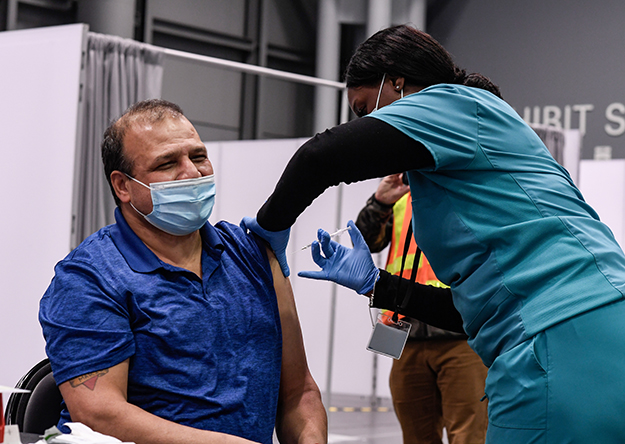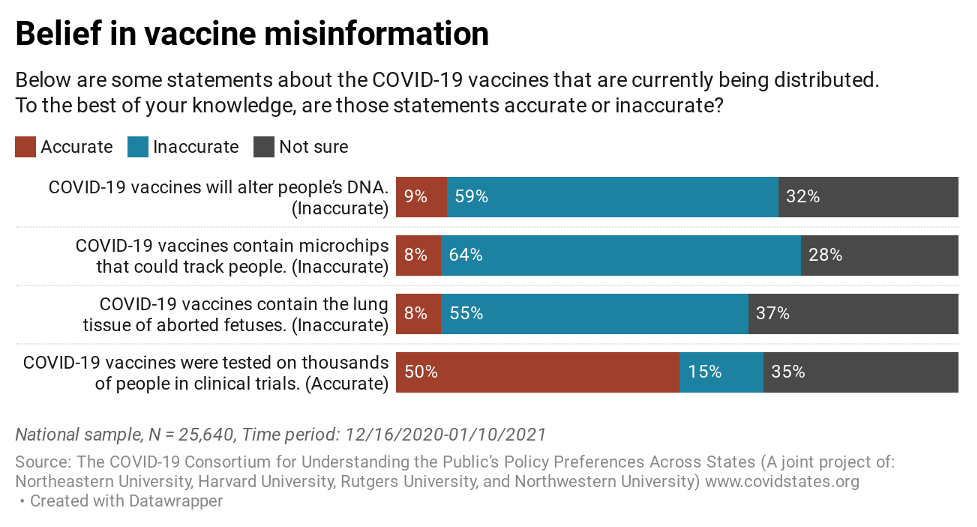As Biden Seeks to Vaccinate 100 Million, Researchers Offer Insights into How
National survey finds most Americans favor vaccination, suggests doctors are best in convincing you to get one
Get all our news
Mass messaging efforts should avoid politically controversial figures and focus on the message and the science.”
James Druckman
IPR political scientist

An employee of the Metropolitan Transit Authority receives a COVID-19 vaccine at New York City's Javits Center
on January 13.
As President Joe Biden promises to vaccinate more than 100 million Americans by the end of his first 100 days in office (April 29), new research offers several critical insights for those in charge of managing such a massive national public health effort.
The researchers, who hail from four major U.S. universities including Northwestern, surveyed approximately 25,000 individuals from around the nation between December 16 and January 10. They accounted for participants’ race, gender, age, education, political affiliation and where they lived. Their findings show that Americans:
- generally favor getting a vaccination themselves (75%),
- do not typically believe COVID-19 vaccine misinformation, though certain groups are more likely to believe false information about vaccines,
- are more likely to be swayed to get vaccinated by messages from their doctors and scientists than those from famous political figures, athletes, or actors, and
- generally agree with current policies prioritizing which groups should get vaccinated first, such as frontline medical personnel and first responders.
More Are Vaccine ‘Hesitant’ Than Vaccine ‘Resistant’
Vaccine Messages That Deliver—and the Messengers Who Do Not
“These are promising findings as there is less vaccine resistance than many anticipated,” said IPR political scientist James Druckman. “It also accentuates that despite the politicization of science during COVID-19, individuals from both parties remain trustful of their physicians and scientists more generally.”
Druckman is part of a university research consortium between Northwestern, Harvard, Northeastern, and Rutgers, investigating attitudes on COVID-19.
Most respondents agreed with putting medical professionals, first responders, and those at greatest medical risk from COVID-19 at the front of the line for vaccines. These are the same groups at the top of current implementation plans.
More Are Vaccine ‘Hesitant’ Than Vaccine ‘Resistant’
In addition to asking standard questions about how likely a person was to get vaccinated (from “least” to “most likely”), the researchers also asked when a person would prefer to be vaccinated (with four possible responses from “as soon as possible” to “never”). This second question allowed the researchers to identify who is just vaccine “hesitant,” or would agree to get the vaccine at some point, from those who are vaccine “resistant,” defined as those who would never get a vaccine at any point.
Their results indicate that 55% of respondents said they are “extremely” or “somewhat” likely to get the vaccine, while 29% said they were “somewhat” or “extremely” unlikely to do so. Asked when they would prefer to get the vaccine, 75% said they would get it at some point—either “as soon as possible” or “after some/most people I know” got it—while 23% indicated “never.” Around 3% answered that they had already received the vaccine.
When breaking down these figures by race and ethnicity, Black respondents were the least likely to say they would get the vaccine: 33% say they would never get the vaccine when compared to White (23%), Latino (20%) and Asian (10%) respondents who said the same. This was not unexpected: Previous studies have identified their mistrust as coming out of persistent inequalities in healthcare access and institutional mistreatment as seen by the infamous Tuskegee syphilis study in the 1930s.
By age, seniors were most enthusiastic about getting vaccinated, with the youngest group of those aged 18–24 being the least enthusiastic, perhaps due to being less affected by the virus.
Interestingly, the researchers find those most resistant to getting a vaccination were aged 25–44. In particular, parents in this age group who had children at home were the most likely of all to say that they would never get a vaccine.
The researchers further probed the depth of respondents’ beliefs in vaccine misinformation by asking them to weigh in on the accuracy of four statements. For example, was it true or false that vaccines will alter people’s DNA or that they were tested on thousands of people in clinical trials? (The answers are false for DNA and true for the clinical trials.) Overall, 50% or more correctly identified the accuracy of each statement. But a troubling number of respondents—nearly a third or more for each question—said they weren’t sure. While this reveals that belief in conspiracy theories about vaccines is not widespread, it also underscores that a good number of the respondents are just generally uninformed.
"The worry is that those who are uninformed become misinformed and then act on that misinformation,” Druckman said. “It is thus crucial to continue efforts to message about the safety of the vaccines."

Vaccine Messages That Deliver—and the Messengers Who Do Not
In addition to asking about attitudes and beliefs around vaccinations, the researchers also ran a series of experiments that looked more closely at how best to communicate to the public about getting vaccines and those best suited to communicate to them.
To test messages, they randomly gave respondents one of five rationales for getting vaccinated, using small written stories or “vignettes.” Researchers asked how likely a person was to get a vaccine if they were told it was their patriotic duty to do it or if their doctor had recommended it. All of the messages but one increased their chances of getting it. Those messages that discussed a physician’s or scientist’s recommendation had the largest effects, while appeals to a person’s patriotism had the smallest.
Despite the spate of famous people televised getting or recommending the vaccine, a famous person who delivers the message typically has only a slight effect on increasing a person’s desire to get a vaccine, the researchers find. Appeals by admired figures like Michael Jordan or Tom Hanks, therefore, would probably not be that helpful in encouraging people to get vaccines.
More importantly, using well-known, politically charged messengers such as Donald Trump (for Democrats) and Barack Obama (for Republicans)—as messengers could lead to more resistance. The researchers point to “out-partisan backfiring” as a likely culprit. Backfiring occurs when partisans become more, not less, resistant to a message after hearing it delivered by someone in the opposite political party.
At the end of the day, it’s who you know personally, like your doctor or friends, that counts the most in convincing you to get the vaccine. Such messengers are especially effective in counties where the virus is on the rampage, according to the researchers.
"Mass messaging efforts should avoid politically controversial figures and focus on the message and the science,” Druckman said. “While in many domains that is it not the best formula, it seems to be here."
Read the complete reports with additional data here and here.
James Druckman is the Payson S. Wild Professor of Political Science and IPR Associate Director. Previous surveys can be found here.
Photo credit: M.A. Hermann/MTA NYC Transit, Flickr.
Funding for the reports came from the National Science, Knight, and the Russell Sage foundations. Data collection was partially supported by Amazon. Any opinions, findings, and conclusions or recommendations expressed in the studies are those of the authors and do not reflect the funders’ views.
Published: January 27, 2021.


